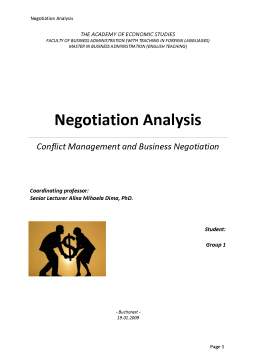Cuprins
- Introduction
- Source of difference.
- Initiation of negotiation
- Alternatives
- Power vs. Reason
- Distributive/Integrative Elements (Creating/Claiming Value)
- The style of negotiation and strategies used in negotiation
- Outcome
- Evaluation
- References
Extras din proiect
Introduction
Negotiation is defined as the process by which a bilateral decision is made by two actively involved parties. The needs and preferences of each party are determined by each of their own goals and values. The end goal of negotiation should be an explicit agreement, long-term policy, or possible social change. Explicit negotiations are the principal underpinning for diplomatic exchanges, whereas tacit actions are used when there is more distrust between the two parties and the explicit communication is incomplete or impossible.
In our ever so fast moving world, we now notice that in order to obtain anything we have to be prepared to negotiate our way through this life. I now see that people use today a clear negotiation style in order to obtain what they pursue. Mostly, even though present times ask for a certain compromise while negotiating, I see that people love to take greater risks today and loose even more than they did let’s say 10 years ago.
As a typical definition a negotiation represents a discussion between more parties that are trying to reach an agreement in order to solve a mutual problem. But more than that a negotiation is a mean to obtain more for less by using different negotiating styles in order to compromise as less as possible and to gain what you came there for, or otherwise leaving.
The voluntary participation of all parties is fundamental to a collaborative approach to managing conflict. One party's decision to negotiate is only effective if the other parties also feel that it is in their best interest to do so. There can be many reasons why people are reluctant to negotiate, even when they are generally willing to find a joint solution. Examples include outstanding fears, major difficulties in communication, and fixed perceptions about opposing parties.
Negotiations of any form are not a mechanical process. Nor are they necessarily easy. Tension, frustration and emotion will probably arise, no matter how carefully or early parties prepare. People may enter the process slowly and fearfully. There may be uncertainty, distrust or anger towards other parties, and this may only become clear when groups meet face to face.
Those who are politically marginalized and highly dependent on the resource base may feel exposed and that they are taking a great risk. The negotiations may show both their hopes and their fears in protecting their families, friends, livelihoods and culture. While some people may be genuinely willing and committed, others may be putting on an act, deceiving or testing relationships. Members of a group may start to feel suspicious of their representative in the negotiation process, and fear that he/she will end up taking "the other side" while their own interests suffer. This may change the whole process, causing some people to reconsider their commitment or react negatively. The outcomes for some groups are often significant, with high risks and potential benefits from the process. Understanding these realities is essential.
But despite the fact that negotiation is so widely used today, people are afraid of it. Why is that? Let’s say that people care for what they want, but prefer to keep what they have and not to lose it through a bad negotiation from his side.
Thus after certain “experts”, this fear is due to the personality of the person in question. There are multiple types of personality, but all these personalities combined, result in fewer and more complex types of personalities.
High Competing Collaborating
Assertiveness Distributive Bargaining
Compromising
Low Avoiding Accommodating
Low Cooperativeness
Mutual Gain Bargaining High
We devised a strategy to try to reduce the hire and we needed to move there immediately as I came with all our bags. I arrived at the flat but there was a big difference from what he told us it looked like and what it really was. He said that the flat was fully functional which meat furniture and other appliances like a stove, central heating and cable and telephon
But the reality was that there was only an old wardrobe and that’s about it. There was heating but the apparatus was missing we had to buy it and install it from our money. The hot water ran from 9 in the morning till 8 in the evening, thus another problem. The former tenant told us that we could not subscribe to a cable and a phone because the former tenants did not pay the subscription in time.
The room of the flat was very small and it has never been painted, ever. The walls were grey as the day the bloc was finished and put into use. I were stunned to see him bragging about how good the flat is. Unfortunately for him we were 2 against him and we started a subtle negotiation with him.
Preview document
Conținut arhivă zip
- Negotiation Analysis - Conflict Management and Business Negotiation.doc















